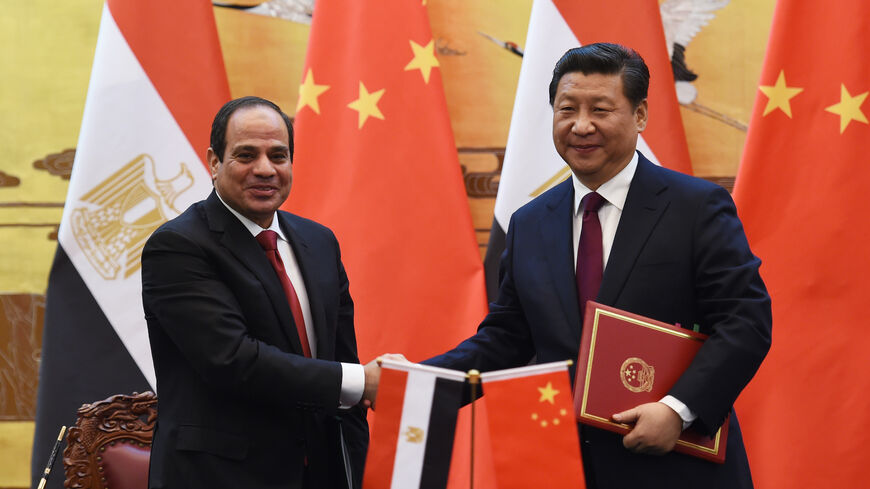In the last couple of years, financial news about Egypt has mainly focused on the country’s economic crisis, mounting debt and subsequent IMF bailout. However, there was some more positive news in May: The African Development Bank approved a Partial Credit Guarantee (PCG) equivalent to $345 million in renminbi as Egypt accessed the Panda bond market for the first time to finance green and social development projects.
The Abidjan-based multilateral development bank said that the PCG will allow Egypt to raise the equivalent of $500 million in the panda bond market, in which a non-Chinese entity issues bonds in Chinese currency that are placed in the domestic market of mainland China. It is often seen as an attractive funding source to businesses and sovereigns looking to diversify their funding and access low-cost capital. In 2022, the market was worth around $21 trillion but the demand for overseas yuan funding is growing.
Egypt’s fundraising also marks the first time an African country has accessed this lucrative market.
Abdourahmane Diaw, country manager for Egypt at the African Development Bank, told Al-Monitor the move will prove beneficial. “The panda bond issuance and related PCG will help Egypt diversify its funding sources, take advantage of better market conditions and develop long-term relationships with local Chinese and international institutional investors in the Chinese panda bond market,” Diaw said.
The development bank said in a press release announcing the approval of the PCG that the funds would go toward projects in clean transportation, renewable energy, energy efficiency, sustainable water and wastewater management and essential health service initiatives as well as financing for micro, small and medium-sized enterprises. These projects are detailed under Egypt’s Sovereign Sustainable Financing Framework published in 2022.
Ali Metwally, an economist and risk analyst specializing in the Middle East and North Africa, said the panda bonds agreement is the product of nearly four years of discussions and research.
“The panda bond deal holds various benefits in terms of diversifying funding sources, accessing a large investor base, improving investor confidence, enhancing bilateral relations with China and improving economic visibility and recognition in the East,” Metwally told Al-Monitor.
The deal is part of Egypt's ongoing efforts to reduce its heavy reliance on Western investors, particularly from the United States and Western Europe, and attract more investors from Asia.
The economist said the rationale behind this strategy includes reducing vulnerability to fluctuations in Western economies, which have significantly impacted Egypt's foreign direct investment inflows. Diversifying the investor base and including more Asian investors would help mitigate this risk.
It is also about assessing new sources of capital that may not be readily available from Western markets.
“Asian investors, including those from China and Japan, possess substantial financial resources and often demonstrate interest in expanding their global investment portfolios,” said Metwally. “Tapping into this pool of resources to fund essential infrastructure projects presents an opportunity to support Egypt's economic development plans. The issuance of the first sovereign sukuk in February serves as another example of this diversification.”
For China, too, this agreement presents opportunities such as redirecting its lending away from conventional infrastructure projects to focus on developing small and medium enterprises, financing green and sustainable infrastructure projects and encouraging private Chinese investment in Africa.
“On the other hand, Egypt's position as one of the top three economies in the Middle East and the second-largest in Africa makes it an attractive destination for both current and new investors, given its significant economic potential,” Metwally added.
He said that to fully maximize the benefits of the panda bond market and attract substantial Asian investment, Egypt needs to cultivate favorable market conditions, keep pricing competitive and introduce lower-risk investment alternatives.
Diaw added, “The issuance and the PCG are designed to give enough confidence and crowd in investors.”
Although Egypt’s high debt bill and soaring global interest rates are likely to last far into 2024, the North African country’s commitment to the International Monetary Fund program, including maintaining fiscal discipline and continuously improving the business environment and investor climate, should prevent any challenges in repaying its panda debt, said Metwally.
The government recently announced 22 investment decisions to boost foreign and private investment in Egypt, without significantly increasing debt risks. They include incentives for investors in various sectors such as agriculture, industry and energy. They also aim to alleviate financial and tax burdens on investors.
Egypt's public debt had been on a declining trajectory since before the pandemic and the Russia-Ukraine conflict, reaching 80% in 2019. (The current level stands at 100%.) Egypt's foreign debt stands at less than 40% of GDP as of now. These metrics are important for investors when considering investing in Egypt.
“Egypt is implementing economic reforms under a well designed IMF program,” Diaw said. “The bank's support is a stamp of confidence and will pave the way to mobilize more resources through debt capital markets."
Metwally predicts tapping the panda bond market to be a continuing trend among African countries following this deal, particularly since Egypt is the first B-rate issuer to do so.
“This development will likely prompt several studies by potential candidates such as Nigeria and Ghana, who have attempted to secure similar deals in the past but failed,” he said.








